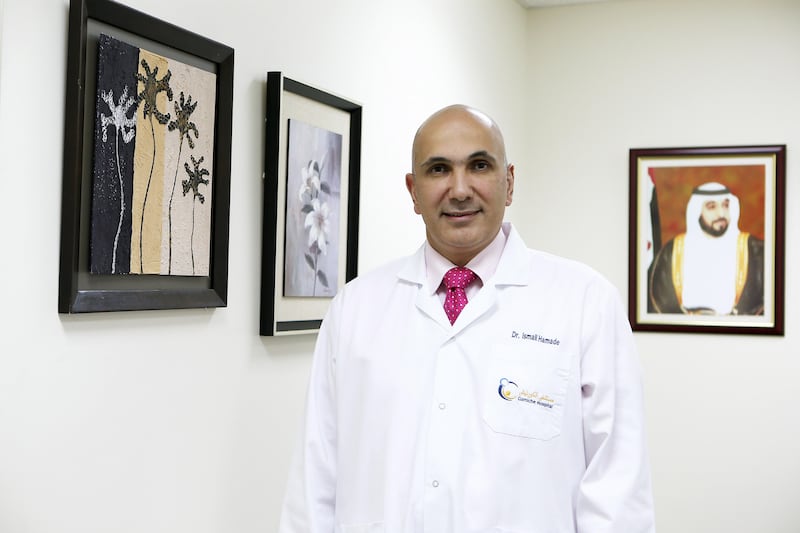The number of abortions at Abu Dhabi’s largest maternity hospital has risen steadily following the introduction of a law that clarified under what circumstances the procedure could be carried out.
Doctors at the government-run Corniche Hospital said the number was about 25 per year in 2013, 2014 and 2015.
Last year it rose to 45 and 25 have been carried out so far this year, suggesting a similar or higher number is expected by the end of the year.
The passing of the Medical Liability Law last year did not change the original 2008 ruling on abortion but clearly set out what conditions had to be met.
Abortions are considered legal in two circumstances – if the mother’s life is at risk because of the pregnancy or if the foetus has a disorder that makes it “incompatible with life” and below 120 days. Abortion is illegal is all other circumstances and cannot be opted into.
Dr Ismail Hamade, medical affairs director at Corniche Hospital, said that historically had doctors “avoided” performing abortions because of the absence of a clear legal framework.
“The new Medical Liability Law signed by Sheikh Khalifa Bin Zayed provided a legal framework for permissible abortions that is compatible with an Islamic perspective," he said.
"The framework embedded in the law enables a permissible abortion in certain medical situations and allows physicians to take appropriate medical-legal decisions.
"Today, we as physicians have better understanding of the law and are more comfortable with making these decisions. I think this explains the increase in the number of permissible abortions compared to previous years."
In 2007, in the absence of a legal framework at that time, permissible abortions were very few.
_____________________
Read more:
[ Call for change in UAE abortion law ]
[ Abortions performed in UAE only if lethal abnormality ‘incompatible with life’ is detected ]
[ Unwanted pregnancies in UAE ‘forcing women into irrational choices’ ]
_____________________
Additionally, Dr Hamade said the decision-making process for permissible abortions was also hindered by the inability to predict the severity of such prenatally-diagnosed conditions, especially in genetic disorders.”
Following the issuance of the original Medical Liability Law in 2008, the number started to increase.
The abortion is “performed by a consultant specialised in obstetrics and gynecology and at the recommendation of the treating consultant for the justified termination of pregnancy,” after the consent of the Medical Specialty Board.
“Advances in pre-natal diagnostic techniques and molecular genetics have made it possible for our doctors to perform prenatal diagnosis early enough and to predict the types of genetic disorders, with its potential subsequent severity," Dr Hamade said.
"Such techniques in the presence of the medical liability law made it possible for our doctors to counsel their patients accurately and in harmony with the law."
Dr Sameh Azzazy, an obstetrician and gynecologist at Well Care Medical Centre in Abu Dubai, also said: “The new law is a relief for us. We now have a better understanding of what the criteria for abortions. It will also reduce the number of women needing to travel abroad to countries where abortions are legal and will also hopefully reduce the number of illegal abortions performed by unlicensed and unethical doctors.”
Dr Azzazy said that he has seen many patients who have developed severe complications after resorting to illegal abortions
“The new law will protect many women and families but we are yet to see clear guidelines distributed to doctors in the private sector,”
Doctors in the private sector are unsure whether the law allows them to perform abortions. Technically, they are able to secure permission but said they instead send patients to government-run facilities.
Dr Aruna Kumari, who works in obstetrics and gynecology at Burjeel Hospital, said she has not heard of an abortion in the private sector for the past eight years.
“We are happy referring them to government hospitals. These cases where abortions are required, are very rare and out of the routine so in a region where abortions are considered taboo it is safer to just refer them to the government," she said.
Abortion-related medicines are also very limited in the private sector, Dr Kumari said.
“Having this procedure under government control prevents any abuse that more likely to occur in the private sector,” she said.
The most common cases of permissible abortions for fetal reasons are anencephaly, lethal chromosomal abnormalities such Meckel Syndrome and Edwards Syndrome, and lethal renal problems.
Permissible abortions for maternal reasons are mainly severe infections such chorioamnionitis, and other life threatening disorders.






